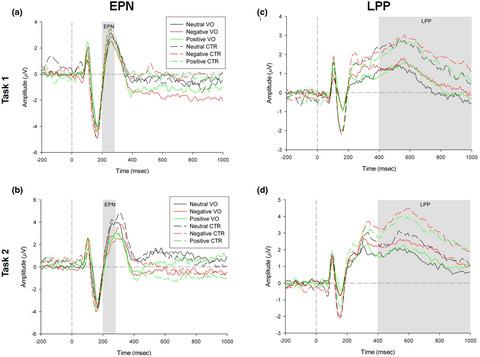当前位置:
X-MOL 学术
›
J. Neurosci. Res.
›
论文详情
Our official English website, www.x-mol.net, welcomes your feedback! (Note: you will need to create a separate account there.)
Does attentional focus modulate affective information processing in male violent offenders with psychopathic traits?
Journal of Neuroscience Research ( IF 4.2 ) Pub Date : 2021-08-10 , DOI: 10.1002/jnr.24941 Jonathan Scheeff 1 , Alexander Schneidt 1 , Michael Schönenberg 1
Journal of Neuroscience Research ( IF 4.2 ) Pub Date : 2021-08-10 , DOI: 10.1002/jnr.24941 Jonathan Scheeff 1 , Alexander Schneidt 1 , Michael Schönenberg 1
Affiliation

|
Antisocial and psychopathic individuals are characterized by a reduced responsivity to affective information. Yet, the role of attentional processes as possible modulator of these deficits is poorly understood. The current study investigated early and late processing of emotional stimuli in a sample of incarcerated offenders while manipulating the attentional focus. Twenty-seven male violent offenders with psychopathic traits and 27 healthy controls completed two experimental tasks while electroencephalography (EEG) data were collected. Task 1 assessed indirect processing of emotional or neutral distractors during a perceptual judgment task, while Task 2 measured direct processing of the emotional or neutral stimuli and required participants to rate the stimuli regarding valence and arousal. EEG data indicated no differences in early stage processing (early posterior negativity) between the experimental groups. However, we found significant group differences with regard to the late processing stage (late positive potential, LPP). Controls showed increased LPP amplitudes in Task 2 as compared to Task 1, indicating that task demands (i.e., attentional focus) had an effect on the processing of the emotional stimuli. In contrast, LPP amplitudes in the violent offender group were largely unaffected by task demands, suggesting specific late alterations in the neural processing of emotional stimuli. In sum, this study provides new evidence for a modulatory impact of attention on affective information processing in male violent offenders with psychopathic traits.
中文翻译:

注意焦点是否会调节具有精神病特征的男性暴力犯罪者的情感信息处理?
反社会和精神病患者的特点是对情感信息的反应性降低。然而,注意力过程作为这些缺陷的可能调节剂的作用却知之甚少。目前的研究调查了在操纵注意力集中的被监禁罪犯样本中情绪刺激的早期和晚期处理。27 名具有精神病特征的男性暴力犯罪者和 27 名健康对照者完成了两项实验任务,同时收集了脑电图 (EEG) 数据。任务 1 在感知判断任务期间评估情绪或中性干扰物的间接处理,而任务 2 测量情绪或中性刺激的直接处理,并要求参与者对有关效价和唤醒的刺激进行评分。脑电图数据表明,实验组之间的早期处理(早期后负性)没有差异。然而,我们发现在晚期处理阶段(晚期正电位,LPP)方面存在显着的群体差异。与任务 1 相比,任务 2 中的对照显示 LPP 振幅增加,表明任务需求(即注意力集中)对情绪刺激的处理有影响。相比之下,暴力罪犯组的 LPP 幅度在很大程度上不受任务要求的影响,这表明情绪刺激的神经处理存在特定的晚期变化。总之,这项研究为注意力对具有精神病特征的男性暴力犯罪者的情感信息处理的调节影响提供了新的证据。我们发现在晚期加工阶段(晚期正电位,LPP)方面存在显着的群体差异。与任务 1 相比,任务 2 中的对照显示 LPP 振幅增加,表明任务需求(即注意力集中)对情绪刺激的处理有影响。相比之下,暴力罪犯组的 LPP 幅度在很大程度上不受任务要求的影响,这表明情绪刺激的神经处理存在特定的晚期变化。总之,这项研究为注意力对具有精神病特征的男性暴力犯罪者的情感信息处理的调节影响提供了新的证据。我们发现在晚期加工阶段(晚期正电位,LPP)方面存在显着的群体差异。与任务 1 相比,任务 2 中的对照显示 LPP 振幅增加,表明任务需求(即注意力集中)对情绪刺激的处理有影响。相比之下,暴力罪犯组的 LPP 幅度在很大程度上不受任务要求的影响,这表明情绪刺激的神经处理存在特定的晚期变化。总之,这项研究为注意力对具有精神病特征的男性暴力犯罪者的情感信息处理的调节影响提供了新的证据。例如,注意力集中)对情绪刺激的处理有影响。相比之下,暴力罪犯组的 LPP 幅度在很大程度上不受任务要求的影响,这表明情绪刺激的神经处理存在特定的晚期变化。总之,这项研究为注意力对具有精神病特征的男性暴力犯罪者的情感信息处理的调节影响提供了新的证据。例如,注意力集中)对情绪刺激的处理有影响。相比之下,暴力罪犯组的 LPP 幅度在很大程度上不受任务要求的影响,这表明情绪刺激的神经处理存在特定的晚期变化。总之,这项研究为注意力对具有精神病特征的男性暴力犯罪者的情感信息处理的调节影响提供了新的证据。
更新日期:2021-08-10
中文翻译:

注意焦点是否会调节具有精神病特征的男性暴力犯罪者的情感信息处理?
反社会和精神病患者的特点是对情感信息的反应性降低。然而,注意力过程作为这些缺陷的可能调节剂的作用却知之甚少。目前的研究调查了在操纵注意力集中的被监禁罪犯样本中情绪刺激的早期和晚期处理。27 名具有精神病特征的男性暴力犯罪者和 27 名健康对照者完成了两项实验任务,同时收集了脑电图 (EEG) 数据。任务 1 在感知判断任务期间评估情绪或中性干扰物的间接处理,而任务 2 测量情绪或中性刺激的直接处理,并要求参与者对有关效价和唤醒的刺激进行评分。脑电图数据表明,实验组之间的早期处理(早期后负性)没有差异。然而,我们发现在晚期处理阶段(晚期正电位,LPP)方面存在显着的群体差异。与任务 1 相比,任务 2 中的对照显示 LPP 振幅增加,表明任务需求(即注意力集中)对情绪刺激的处理有影响。相比之下,暴力罪犯组的 LPP 幅度在很大程度上不受任务要求的影响,这表明情绪刺激的神经处理存在特定的晚期变化。总之,这项研究为注意力对具有精神病特征的男性暴力犯罪者的情感信息处理的调节影响提供了新的证据。我们发现在晚期加工阶段(晚期正电位,LPP)方面存在显着的群体差异。与任务 1 相比,任务 2 中的对照显示 LPP 振幅增加,表明任务需求(即注意力集中)对情绪刺激的处理有影响。相比之下,暴力罪犯组的 LPP 幅度在很大程度上不受任务要求的影响,这表明情绪刺激的神经处理存在特定的晚期变化。总之,这项研究为注意力对具有精神病特征的男性暴力犯罪者的情感信息处理的调节影响提供了新的证据。我们发现在晚期加工阶段(晚期正电位,LPP)方面存在显着的群体差异。与任务 1 相比,任务 2 中的对照显示 LPP 振幅增加,表明任务需求(即注意力集中)对情绪刺激的处理有影响。相比之下,暴力罪犯组的 LPP 幅度在很大程度上不受任务要求的影响,这表明情绪刺激的神经处理存在特定的晚期变化。总之,这项研究为注意力对具有精神病特征的男性暴力犯罪者的情感信息处理的调节影响提供了新的证据。例如,注意力集中)对情绪刺激的处理有影响。相比之下,暴力罪犯组的 LPP 幅度在很大程度上不受任务要求的影响,这表明情绪刺激的神经处理存在特定的晚期变化。总之,这项研究为注意力对具有精神病特征的男性暴力犯罪者的情感信息处理的调节影响提供了新的证据。例如,注意力集中)对情绪刺激的处理有影响。相比之下,暴力罪犯组的 LPP 幅度在很大程度上不受任务要求的影响,这表明情绪刺激的神经处理存在特定的晚期变化。总之,这项研究为注意力对具有精神病特征的男性暴力犯罪者的情感信息处理的调节影响提供了新的证据。



























 京公网安备 11010802027423号
京公网安备 11010802027423号